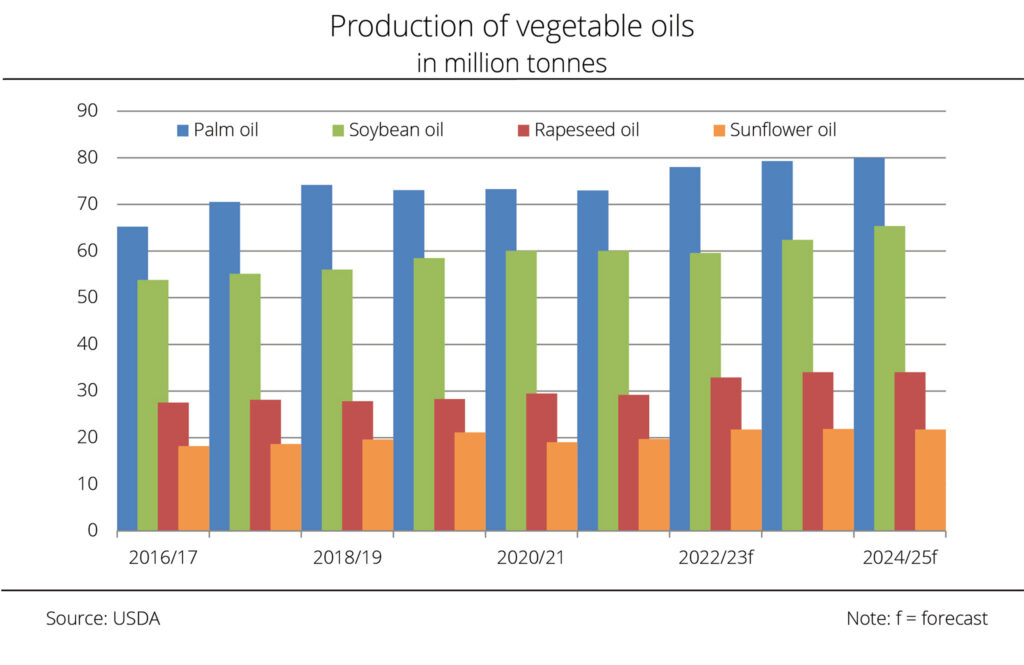
Global production of vegetable oils continues to increase to new record highs in the 2024/25 crop year. Production of both soybean and palm oil is on the rise. However, production of sunflower oil will probably decline.
According to the latest outlook published by the US Department of Agriculture (USDA), 2024/25 global production of vegetable oils will amount to 228.3 million tonnes. This would be a 4.5 million tonne rise compared to 2023/24. In other words, production could fully cover demand of presumably 224.9 million tonnes.
According to investigations conducted by Agrarmarkt Informations-Gesellschaft (mbH), palm oil is set to remain the world’s most important vegetable oil in terms of manufacture and consumption, with global output estimated at 80.0 million tonnes. This translates to a 715,000 tonne increase over 2023/24. In other words, palm oil accounts for just over 35 per cent of total global vegetable oil production. Indonesia remains the largest producer with an output of 47.5 million tonnes, followed by Malaysia with 19 million tonnes and Thailand with just less than 3.4 million tonnes.
Production of soybean oil is expected to grow just less than 3.0 million tonnes to 65.4 million tonnes in the coming crop year and could hit a new record. China remains the primary producer with production amounting to 18.5 million tonnes – based, however, on correspondingly large seed imports. The US ranks second with 12.9 million tonnes. Production of rapeseed oil is expected to reach 34.0 million tonnes in 2024/25, just slightly less than in 2023/24. By contrast, production of sunflower seed oil is seen to drop around 103,000 tonnes to 21.7 million tonnes in 2024/25. Above all, this estimate reflects production declines in Argentina and Ukraine. The expected increase in sunflower oil production in the EU-27 is unlikely to offset these decreases.
In view of the continued increase in global vegetable oil production, the Union zur Förderung von Oel- und Proteinpflanzen e.V. (UFOP) has pointed out that from a global perspective, a distinction must be made between products certified as sustainable and products not certified as sustainable and that the potential for waste oils is naturally limited. Contrary to crop biomass, in the case of waste oils for biofuels production it is irrelevant whether the feedstock is sourced from deforested areas or not. The UFOP therefore considers the cap under EU law of 1.7 per cent of fuel consumption in road and rail traffic to be appropriate.
Assuming that 5 per cent to 10 per cent of global vegetable oil production can be collected as waste oil, this would translate to a global waste oil tonnage of approximately 11.4 million to 22.8 million tonnes. Assessing the substitution potential, the UFOP has stressed that diesel consumption in Germany alone amounts to 33.4 million tonnes. The association has underlined the dimension the fuel market has in relation to the agricultural commodities markets. It concludes that in order to achieve the 2030 climate change mitigation target, all options of greenhouse gas emission reduction in the transport sector need to be used without giving preference to any specific technology or feedstock.
Source
Supplier
Agrarmarkt Informations-GmbH (AMI)
Union zur Förderung von Oel- und Proteinpflanzen e.V. (UFOP)
US Department of Agriculture (USDA)
Share
Renewable Carbon News – Daily Newsletter
Subscribe to our daily email newsletter – the world's leading newsletter on renewable materials and chemicals










